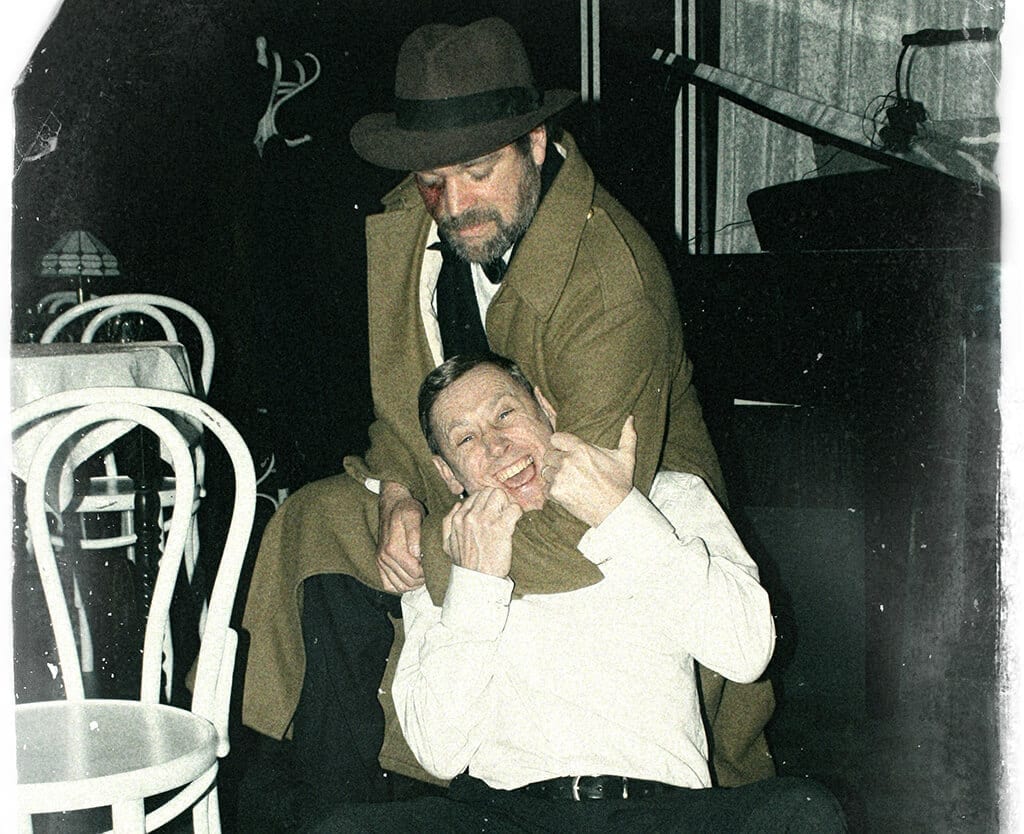Dr Jekyll and Mr Hyde is renowned as a work of dark, gothic fantasy – demanding plausible and intense terror. Blue Orange Theatre’s 1930s jazz bar captures the mystery and threat of the Gothic through moody low lighting and the menacing background tones of the live piano.
Respectable lawyer Utterson is becoming increasingly worried for his client and friend Dr Jekyll who is acting most strangely, refusing to see everyone, even his fiancée Connie. To his horror, he learns that Jekyll has changed his will, signing over all his property to the mysterious and questionable figure of Mr Hyde. Despite Jekyll’s entreaties to leave the matter, Mr Hyde’s increasingly violent offenses provoke Utterson to investigate this strange figure and the power he holds over his friend.
Dr Henry Jekyll (Oliver Hume) warns that we all hide behind a mask of civility, constantly suppressing our dark violent and sexual urges. Through the help and outlet of Mr Hyde Jekyll removes his mask, much to the misfortune of fiancée Connie (Sarah Gain), entrancing club singer Rose (Nicola Foxfield) and long-suffering butler Poole (Stuart Horobin).
The end of the play leaves Jekyll’s ugly scar of misconduct exposed for all to see – despite the attempts of Mr Utterson (Daniel Blacker).
Accent is employed excellently by all in order to facilitate the necessary multi-role within the piece. Blacker portrays the likable and trustworthy Utterson especially well, successfully encapsulating the pleasantry as well as genuine concern of the character for his friend Dr Jekyll. It is a shame that for the majority of the piece he is directed Up Stage as key moments of realisation and comedy within the character are visually missed.
The Grand Piano remained central to all action and shaped the piece well, effectively setting both ambient and ominous atmospheres. In fact, one grew so accustomed to the backdrop of jazz that the flashes of silence were intensified, heightening the needed horror for those particular moments perfectly. The Blue Orange Theatre is keen to convey that there are moments when song choice is specifically employed to play against the gritty and emotional charged dialogue. The most obvious example of this is a horrific visual death scene underscored by the jarring line: “I’m in heaven” of Irving Berlin’s ‘Cheek to Cheek’ – an effectively chilling technique.
The style of the performance came across as a little confused. There were attempts to create stylised non-naturalism – most costume changes/makeup applications were done in full view of the audience. However, in order to sustain the necessary mystery of the play, this was not carried through in full, prompting the questioning of its relevance within the piece.
Having said that, The Blue Orange Theatre’s ‘Dr Jekyll and Mr Hyde’ remained true to the original text. It successfully captured the complexity of the human psyche and proved an enjoyable evening’s entertainment.

